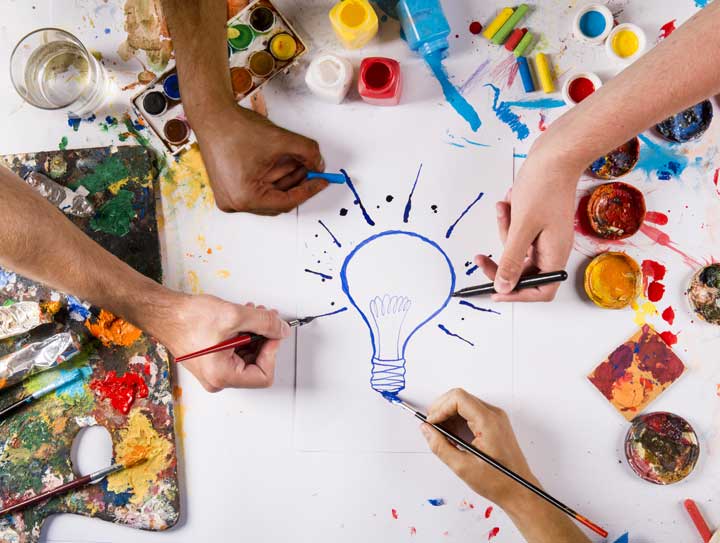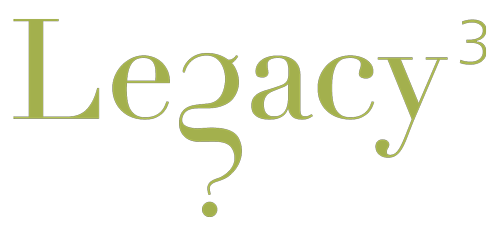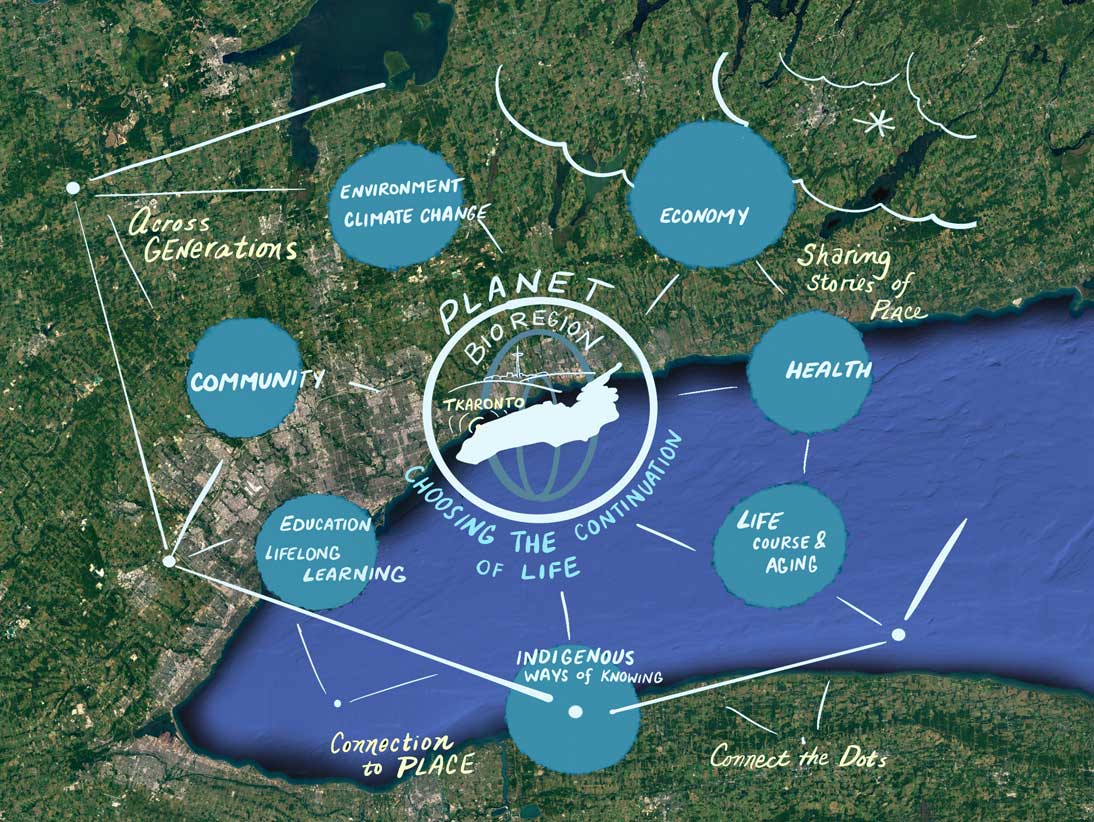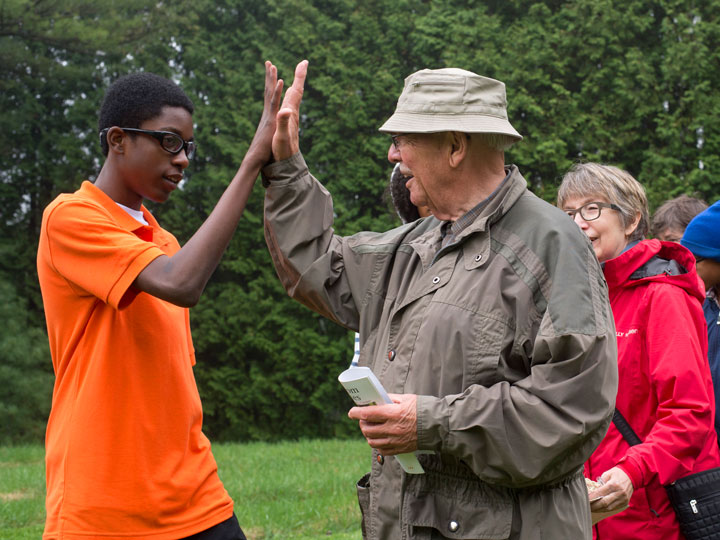
The 7-Generation Bioregional Earth Summit
is
about regenerating our future – rippling out from
the
GTB (Greater Tkaronto Bioregion) to
the
four directions of our planet
is about regenerating our future – rippling out from
the GTB (Greater Tkaronto Bioregion) to
the four directions of our planet
The 7-Generation Bioregional Earth Summit is now over, but you can still register to access recordings of all the sessions.
We are in ecological and cultural overshoot. We face deeply complex, interconnected local and global crises – and they will continue, increasing in intensity.
We are called to whole systems transformation – across generations and bioregions – that manifests as both big and bold (revolution) AND small and steady (evolution).
The 7-Generation Bioregional Earth Summit is not your normal conference – by design. Emphasizing intergenerational and place-based (bioregional) dynamics, the Summit will connect the dots across seven broad themes: environment/climate, economy, community, health, education, life course, and Indigenous worldviews/ways of knowing. We'll fractally scale-link from the GTB (Greater Tkaronto Bioregion) to the Great Lakes Basin and other parts of Turtle Island, culminating with the entire planet and the birth of the new Bioregional Earth network.
As we slide across themes and scales, the Summit will feature both local and international speakers. The GTB is leading and learning from bioregions forming around the planet.
We're looking to #ChangeTheStory of how we live with each other on a changing planet in uncertain times. The Summit itself will be an unfolding story – like a flower slowly blossoming through the week. Take a moment to feel into that evocative metaphor with this video.
The 7-Generation Bioregional Earth Summit is a collaborative effort of the Legacy Project, as the core team for 7-Generation GTB, and the Design School for Regenerating Earth, with the Indigenous Environmental Institute (IEI) at Trent University.
If you care about our future, this Summit is a uniquely curated experience unlike any other. Ready to REGISTER?
CONTEXT

The GTB is
 Through
Through
 7-Generation GTB is systems complexity work. It brings together both social regeneration and ecological regeneration for ecopsychosocial wellbeing on the timescale of lifetimes across generations.
7-Generation GTB is systems complexity work. It brings together both social regeneration and ecological regeneration for ecopsychosocial wellbeing on the timescale of lifetimes across generations.
Check out the
We take a "short-term for the long-term approach" – helping/saving as much as possible now, while centering life in every decision and action. Metaphorically, we talk about this as growing a Tree of Life.
Find out more about the underlying bioregional and intergenerational dynamics, as well as the seven themes. There's also a collection of videos you can explore ahead of the 7-Generation Bioregional Earth Summit.
NOT A TRADITIONAL CONFERENCE
 Don't expect a traditional conference, where you pick the sessions that interest you and pull out the occasional nugget.
Don't expect a traditional conference, where you pick the sessions that interest you and pull out the occasional nugget.
This is a working Summit, in which we invite you to work as hard as we're working to bring together something meaningful and pragmatic in this uncertain moment in human history. Like summiting a mountain, the
We'll share resources ahead of time and ground concepts in the real world. We hope you'll engage as much as you can with the entire week-long flow to allow your mind to feel into the complexities and enable possibilities to emerge. Each session has been carefully curated; every speaker has been specially invited to bring their unique voice and perspective to the story tapestry.
SUMMIT PROGRAM
The 7-Generation Bioregional Earth Summit February 5-10, 2024, is the unfolding of a story through a series of sessions that slide across themes and scales.
The first session, around the Legacy Table at The Cedars site in the GTB, will be intimate and personal. We'll move up to the planetary scale on the final day, with the birth of the new Bioregional Earth network.
 The story will start as many stories do, "Once upon a time… as the world was in crisis, generations came together, grounded by the land, to #ChangeTheStory…" We'll write the rest of the story together, throughout the week-long Summit… and beyond.
The story will start as many stories do, "Once upon a time… as the world was in crisis, generations came together, grounded by the land, to #ChangeTheStory…" We'll write the rest of the story together, throughout the week-long Summit… and beyond.
Each day of the 7-Generation Bioregional Earth Summit is connected to those before and after it. We'll have Threads running through the Summit as a way to help participants make interconnections and build coherence. These are our Threads:
- Patricia Kambitsch is a visual storyteller who will do a series of sketchart pieces to tell the story from day to day, so that by the end of the Summit the week-long story will be visible.
- Joe Brewer is a global regeneration leader and Co-Founder of the Design School for Regenerating Earth. With a background in both earth science and cognitive science, Joe will do weaving and sensemaking as he facilitates sessions throughout the week to help the story emerge.
- Nora Bateson is a complexity thinker, educator, author and filmmaker known for her Warm Data work. Says Bateson, "Developing an understanding of the patterns and processes of interdependency in complexity is the single most practical capacity that we can support in ourselves and each other." Nora will speak on Wednesday. Throughout the Summit, we'll share provocations from her new book Combining.
- An Indigenous thread will run throughout the Summit, in particular through the voices of Oren Lyons and Dr. Dan Longboat.
- Each day of the Summit, we'll share EcoArt created by students and elders who are part of the 7-Generation GTB Intergenerational Zone in partnership with local schools. Said Edgar Degas, "Art is not what you see, but what you help others see." This rhythm of intergenerational voices reminds us to think beyond a given session/moment to lifetimes across generations. The theme of the EcoArt is "Regenerate Earth," inspired by the Regenerate Earth poster with artwork by community artist Clare Attwell.
The 7-Generation Bioregional Earth Summit is a hybrid experience. Most sessions will be virtual/livestreamed for a local and international audience.
There will be three in-person days in Toronto (partially livestreamed) with limited seating: Tuesday, February 6 as an intergenerational-focused day; Thursday, February 8 as an Indigenous-focused day; and Saturday, February 10 as the celebratory birth of the global Bioregional Earth network.
When you REGISTER for the 7-Generation Bioregional Earth Summit, you get general access to the Summit platform and to recordings after the Summit. To help us estimate our webinar platform capacity, we ask that you also sign up for each virtual day you think there's a high likelihood you'll participate in live.
If you're interested in attending the
There is no registration fee to participate in the 7-Generation Bioregional Earth Summit. We appreciate donations to support our work.
Click here to REGISTER. An overview of each day appears below. You can also click through to more detailed descriptions for each day, starting with Monday, February 5. Check back for updates!
MONDAY, FEBRUARY 5
Opening Session: Walking a Regenerative Pathway to #ChangeTheStory
9:00 am – 12:00 noon EST (Toronto), virtual
Featured speakers include David Crombie, Sandra Laronde, Joe Brewer, Penny Heiple, Susan V. Bosak,
Bioregional Learning Centers as a Keystone
1:00 pm – 4:00 pm EST (Toronto), virtual
Featured speakers include Joe Brewer, Cascadia core team of Brandon Letsinger and Clare Attwell, and GTB experts Kathryn Bakos, Jenn Pfenning, Francine McCarthy
Summit Lounge
Hosted by Roberta Hill, Bioregional Coordinator
Center for an Ecology-Based Economy, Maine
4:30 pm – 5:30 pm EST (Toronto), virtual
The Honourable David Crombie, former Mayor of Toronto and federal cabinet minister, and author of the seminal 1992 Regeneration report, will open the
TUESDAY, FEBRUARY 6
Registration starts at 8:30 am
Program runs 9:00 am – 4:00 pm, in person at the Kortright Centre with
livestreaming in the morning only
Fired-up Youth and Feisty Grannies
9:00 am – 12:00 noon EST (Toronto), in-person and livestreamed
Opening performance by Red Sky founded by Sandra Laronde; featured speakers include Debbe Crandall, Kiran Topiwala, Joe Brewer with Natalia Ortiz and Oscar Vesga, Dr. Peter Whitehouse, Dr. Isabela Granic
Feeling the Path
1:00 pm – 4:00 pm EST, in person only (no livestream)
Summit Lounge
Hosted by Roberta Hill, Bioregional Coordinator
Center for an Ecology-Based Economy, Maine
6:00 pm – 7:00 pm EST (Toronto), virtual
In the morning, we'll explore how generations can walk a regenerative path together, in community. Can we all see ourselves as elders-in-training to find the wisdom we need? In the afternoon, participants attending in person will take part in an embodied learning experience using the concept of the Carrier Bag. Find out more about Tuesday, February 6.
WEDNESDAY, FEBRUARY 7
Regenerative Economies and Bioregional Funding Ecosystems
9:00 am – 12:00 noon EST (Toronto), virtual
Featured speakers include Samantha Power, Vicki Saunders, Justine Dainard, Natalia Ortiz, Joe Brewer
Storytelling and Sensemaking
1:00 pm – 4:00 pm EST (Toronto), virtual
Featured speaker is Nora Bateson
Summit Lounge
Hosted by Roberta Hill, Bioregional Coordinator
Center for an Ecology-Based Economy, Maine
4:30 pm – 6:00 pm EST (Toronto), virtual
Option for an afternoon field site experience in the GTB
In the morning, we'll explore what we value and how that might translate into new financial structures, including a Bioregional Foundation to pool resources for regeneration projects. After that left-brain focus, we'll engage the right brain in the afternoon with an interactive and inspiring Warm Data sensemaking experience. NOTE: For those in the GTB, there's an option in the afternoon for a field site experience at Riverdale Farm in the Caledon area. Find out more about Wednesday, February 7.
THURSDAY, FEBRUARY 8
Registration starts at 8:30 am
Program runs 9:00 am – 4:00 pm EST (Toronto), in person at the Kortright Centre with livestreaming both morning and afternoon
Co-facilitated by Dr. Dan Longboat and Joe Brewer; featured speakers include Oren Lyons with his son Rex, Jason Baldes, Henry Lickers, Mary-Claire Buell, Larry McDermott
We want to live in the world of the Eagle and the Condor, and on this day we’ll practice for a Bioregional Earth. We need the best of Indigenous ways of knowing and knowledge with the best of Western science. In the morning, Indigenous voices from across Turtle Island share the stories of their landscapes. In the afternoon, these Indigenous leaders and elders offer their counsel as we explore a Third Way forward. Find out more about Thursday, February 8.
FRIDAY, FEBRUARY 9
Listening to the Land
9:00 am – 12:00 noon EST (Toronto), virtual
Featured speakers include Joe Brewer, John Stille, Karen Thompson, Janet McKay, Susan Walmer, Saba Ahmad
Unprecedented Collaboration
1:00 pm – 4:00 pm EST (Toronto), virtual
Featured speakers are Jonathan Rowson, Joe Brewer, Oren and Rex Lyons, and Jay Bowen
Option for an afternoon field site experience in the GTB
In the morning, we explore what it means to listen to the land, with on-the-ground examples. In the afternoon, we'll do a deep dive into the nature of humanity and how we might come together in this critical moment in history. For those in the GTB, there's an option in the afternoon for a field site experience at Heartwood Farm & Cidery in the Caledon area. Find out more about Friday, February 9.
SATURDAY, FEBRUARY 10
Registration starts at 12:30 pm
Program runs 1:00 pm – 4:00 pm EST (Toronto), in person at the Kortright Centre (informal reception at end) with livestreaming
Featuring musician Mimi O'Bonsawin; speakers include Joe Brewer and Dan Longboat, along with people like you who care, from around the planet
Option for a morning field site experience in the GTB
As the 7-Generation Bioregional Earth Summit comes to a close, gather together, ground yourself, find the story. This promises to be a profound and historic moment as we connect with bioregions around the world to birth Bioregional Earth. For those in the GTB, there's an option in the morning for a guided tour of the McMichael Gallery (which is near the Kortright Centre). Find out more about Saturday, February 10.
Detailed descriptions for each day:
Monday, February 5
Tuesday, February 6
Wednesday, February 7
Thursday, February 8
Friday, February 9
Saturday, February 10
REGISTER now for the 7-Generation Bioregional Earth Summit – there is no registration fee (we appreciate donations to support our work). Questions? E-mail Brian Puppa, Executive Director, Legacy Project or call (905) 852-3777.








